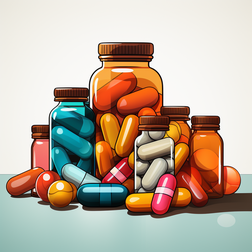Over the counter options for treating erectile dysfunction.
- Introduction to Erectile Dysfunction (ED)
- FDA Regulations and Over-the-Counter (OTC) ED Supplements
- Overview of Prescription Medications for ED
- Other Standard Treatment Options for ED Management
- Risks and Effectiveness of OTC ED Supplements
- Telehealth and ED Treatment Consultations
- OTC ED Alternatives: Dehydroepiandrosterone (DHEA), L-arginine, Ginseng, Yohimbe, and Propionyl-L-carnitine
- Importance of Seeking Medical Advice for ED Treatment
- How do over-the-counter treatments compare to prescription medications
- How can I get hard without ED pills?
- Is there an over-the-counter drug that helps with ED?
- What helps ED immediately?
- What are the potential side effects of over-the-counter treatments
- Can I buy sildenafil over-the-counter?

Introduction to Erectile Dysfunction (ED)
Erectile dysfunction (ED) is a common condition that impacts a significant portion of men worldwide. It's characterized by the inability to achieve or maintain an erection sufficient for satisfactory sexual activity. This condition can significantly impact a person's quality of life, leading to stress, relationship issues, and low self-confidence.
FDA Regulations and Over-the-Counter (OTC) ED Supplements
The Food and Drug Administration (FDA) regulates the approval and marketing of both prescription and over-the-counter (OTC) medications. To date, the FDA has not approved any OTC supplements specifically for the treatment of ED. This is primarily due to concerns over safety, efficacy, and product quality. However, several OTC options exist that have been associated with improved sexual function, although these supplements are not officially designated as ED treatments.
Overview of Prescription Medications for ED
The most commonly prescribed medications for ED are sildenafil (Viagra), tadalafil (Cialis), and vardenafil (Levitra, Staxyn). These medications, known as PDE5 inhibitors, work by enhancing the effects of nitric oxide, a chemical that relaxes muscles in the penis, allowing blood flow to increase during sexual stimulation. They have proven to be effective for many men suffering from ED.
Other Standard Treatment Options for ED Management
Apart from oral medications, other treatments for ED include testosterone replacement therapy (TRT), penile implants, vacuum erectile devices (VEDs), ED rings, injectable drugs, suppository drugs, and in some cases, blood vessel surgery. The choice of treatment is usually based on the individual's health status, the cause of ED, and personal preference.
Risks and Effectiveness of OTC ED Supplements
It's important to note that while some OTC supplements may be associated with improved sexual function, their efficacy in treating ED specifically is less certain. Also, these products come with their own risks. They may interact with other medications or underlying conditions, and their quality can vary. As they are less regulated than prescription drugs, there may be inconsistencies in dosage and purity.
Telehealth and ED Treatment Consultations
Telehealth has emerged as a viable option for individuals seeking consultation and treatment for ED. It offers convenience, privacy, and can often provide quicker access to healthcare professionals. A telehealth consultation can help determine the most suitable treatment strategy, whether that involves prescription medications, lifestyle changes, or exploration of OTC supplements.
OTC ED Alternatives: Dehydroepiandrosterone (DHEA), L-arginine, Ginseng, Yohimbe, and Propionyl-L-carnitine
Some over-the-counter supplements have been associated with improved sexual function. Dehydroepiandrosterone (DHEA), a hormone produced by the adrenal glands, has been studied for its potential role in improving sexual function and has shown some promising results.
L-arginine is an amino acid that may help widen blood vessels, potentially improving blood flow to the penis. Ginseng, particularly the Panax variety, has been associated with improved erectile function in some studies.
Yohimbe, an extract from the bark of an African tree, has been used for centuries for male sexual dysfunction. However, it can cause significant side effects, so it should be used with caution. Propionyl-L-carnitine, often used alongside Viagra in studies, shows promising results but requires further investigation.
Importance of Seeking Medical Advice for ED Treatment
Seeking professional medical advice is critical when dealing with erectile dysfunction. ED can be a symptom of more serious health conditions like heart disease or diabetes, so it's important to rule out these underlying issues. Furthermore, a healthcare professional can provide guidance on the safest and most effective treatment options for each individual, including both prescription medications and potential OTC alternatives.
How do over-the-counter treatments compare to prescription medications
The prescription medications for ED have been through rigorous clinical trials and are FDA-approved, meaning their safety and efficacy are well-established. While some OTC supplements may have been associated with improved sexual function, they are not specifically designed to treat ED, and their efficacy and safety profile isn't as well-established.
How can I get hard without ED pills?
There are several alternatives to pills for treating ED. These include lifestyle changes, such as regular exercise, a healthy diet, limited alcohol consumption, and quitting smoking. Non-pill treatment options include testosterone replacement therapy, vacuum erectile devices, penile implants, or blood vessel surgery. It's important to consult with a healthcare professional to determine the most suitable treatment.
Is there an over-the-counter drug that helps with ED?
While the FDA has not approved any OTC drugs specifically for ED, some supplements may improve sexual function.
These include DHEA, L-arginine, Ginseng, Yohimbe, and Propionyl-L-carnitine.
However, their safety and effectiveness are not as well-studied as prescription medications, and they may not be suitable for everyone.
What helps ED immediately?
Medications such as sildenafil, tadalafil, and vardenafil can often produce results within 30 to 60 minutes. However, these require a prescription. OTC supplements typically do not work as quickly and may require consistent use over time to see any potential benefits.
What are the potential side effects of over-the-counter treatments
Potential side effects of OTC treatments can vary depending on the specific supplement and can include gastrointestinal discomfort, nausea, and other side effects. Some, like Yohimbe, may cause significant side effects such as increased heart rate and blood pressure. Additionally, they may interact with other medications. Always consult with a healthcare professional before starting any new supplement.
Can I buy sildenafil over-the-counter?
As of the time of writing, sildenafil (Viagra) is not available over the counter in the United States. It requires a prescription from a healthcare professional. This is because it's important to determine if it's safe and appropriate for the individual, considering their overall health, other medications they may be taking, and the severity of their ED.



